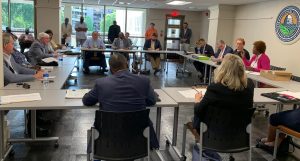Written by Joseph Bryant
The City of Montgomery and Montgomery County are setting new standards for government and community collaboration with an unprecedented partnership to enhance the lives of more than 230,000 people who call the Capitol City and the River Region home.
 Montgomery Thrive is a nearly $86 million effort to support programs and initiatives with funding from the American Rescue Plan Act (ARPA). Spending priorities are diverse and include support for public safety, mental health crisis intervention, emergency home repair, enhanced community recreation services, new sewer infrastructure, and securing broadband internet services countywide. Each project is guided by input from citizens gathered through a widely disseminated survey and a series of listening sessions.
Montgomery Thrive is a nearly $86 million effort to support programs and initiatives with funding from the American Rescue Plan Act (ARPA). Spending priorities are diverse and include support for public safety, mental health crisis intervention, emergency home repair, enhanced community recreation services, new sewer infrastructure, and securing broadband internet services countywide. Each project is guided by input from citizens gathered through a widely disseminated survey and a series of listening sessions.
The Montgomery County Commission received $43.9 million, while the City of Montgomery received $41.6 million in federal funding. Combined, the $85.5 million dollars invested will impact the lives and future generations of Montgomery residents for years to come.
“We decided that we could maximize our investment by combining our resources because we serve the same people,” explained Montgomery County Commission Chairman Doug Singleton. “For many, many years, we’ve always tried to work together. It’s important, not just in this, but when you’re out recruiting businesses, to have both entities of government working together. We try to do what’s best for the entire city and the entire county of Montgomery.”
ARPA was designed to provide state and local governments with financial assistance in response to the COVID-19 pandemic. The act created the State and Local Fiscal Recovery Fund, which provides the financial assistance. At its foundation, Montgomery Thrive is a community-focused and community-led initiative, said Montgomery Mayor Steven Reed.
“The influx of the American Rescue Plan Act funds offers an historic opportunity for the city and county to work together to make the greatest impact, which is why we united to create Montgomery Thrive,” Reed said. “The Montgomery Thrive website and initiative gives Montgomery residents the opportunity to learn about the American Rescue Plan funds and offer input on how these funds should be utilized for the betterment of our city and county.”
A major item on the priority list is already underway. Officials have begun the bid process to purchase enhanced body cameras for the police department and sheriff’s department that will allow officers to communicate with mental health professionals when encountering someone who may be undergoing a mental health crisis.
If an officer encounters someone with mental health issues, they can access a direct communication line with mental health professionals to seek professional guidance on how to respond.
Singleton, an outdoors enthusiast, is especially excited about opportunities to enhance recreational opportunities and amenities throughout the county. This is especially important if another public health emergency occurs and limits indoor interaction.
The pandemic and the restrictions that it brought illustrated the need for better recreational offerings, he said. Those activities serve multiple purposes of recreation, physical fitness and positive mental health support, Singleton said. “That was one that spurred my interest, being able to provide more opportunities for people so they can get out and have things they can do in a safe, open type of environment,” he said.
Montgomery Thrive leaders are actively engaged in transforming the list of community needs from concepts into reality. For example, the County Commission on May 17 took action on mental health initiatives when it approved the Sheriff’s Office body worn cameras, along with funding to Carastar Health for a mental health crisis diversion center. Carastar Health is a public, nonprofit corporation that provides mental health services throughout the County. Both the City and County governments approved plans for Phase I of Montgomery Thrive on June 21. Phase II plans were endorsed by the City on July 19 and the County on August 9.
Leaders expect the procurement process to begin on Phase I priorities by the end of this month. The priority list is the result of community meetings, 10 subcommittee meetings and 10 months of planning. Community engagement and input remain essential throughout the process, said Susan Kennedy, a partner with Levitate Legal and Consulting, the Montgomery-based firm hired as a consultant to coordinate the ongoing initiative.
All spending is evidence-based with officials studying other programs around the country to develop the right fit for Montgomery and Montgomery County, Kennedy said. Montgomery Thrive was designed to address the specific needs and challenges of our community, she said. “We don’t know of another city and county that are working together on this level,” Kennedy said. “Montgomery’s program is ambitious, and it touches every part of the community. We got that directive from the community. These programs
are responsive to what the community asked for.”